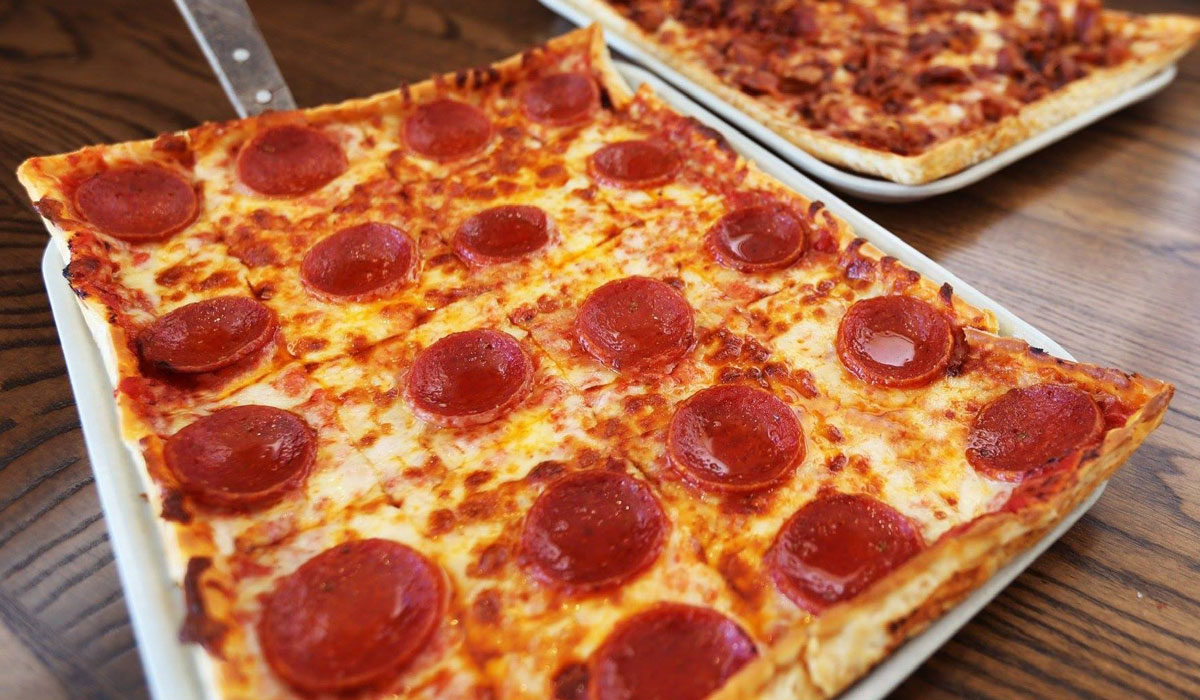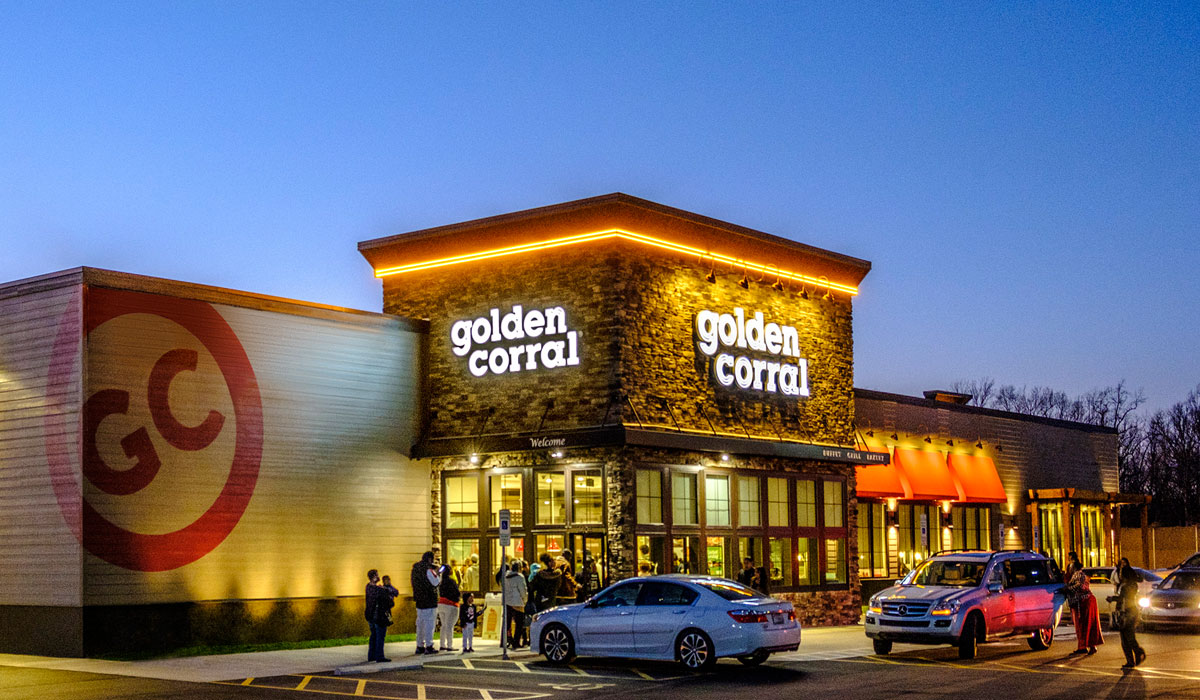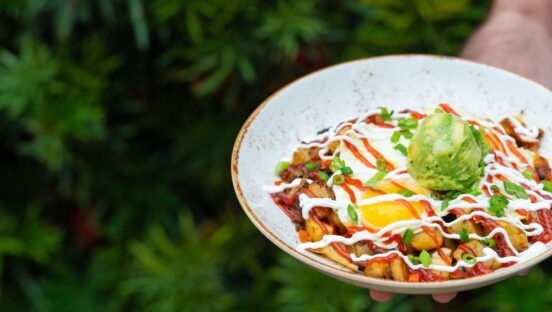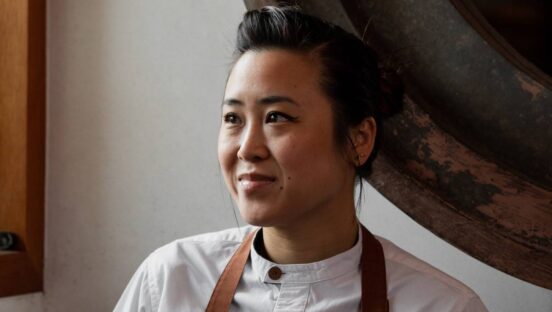












Remember March 11, 2020? It was the day COVID-19 went from a vague interruption into something apocalyptic. The WHO declared the outbreak could be labeled a “pandemic.” Then-President Donald Trump announced restrictions on foreign travelers. The Dow Jones Industrial Average entered a bear market. Actor Tom Hanks and his wife, Rita, announced they tested positive for coronavirus. The NBA postponed its season, which many—at the time—pointed to as the large-scale event that truly set off the country’s market-by-market shutdowns. And the restaurant sales dive was on.
We’re now a little more than a year removed. According to industry tracker Black Box Intelligence, same-store sales growth was negative 12.6 percent in February—a 7.8 percentage point drop from January. Yet analyzing the data at the weekly level reveals a more optimistic tone.
Weather was the biggest factor. Severe winter storms during the second and third weeks wreaked havoc in large areas of the country not typically faced with this kind of weather. Comparable restaurant traffic was negative 19.1 percent, year-over-year, during the month, down 7 percentage points from January and the worst mark since July. Again, to the weather issue, figures during the third week of February fell 23 percent—the lowest number since mid-June.
To some extent, it’s almost relieving to see more traditional factors drag performance. It suggests the industry’s continued, albeit irregular, recovery is in sight. Plus, there’s a $28.6 billion revitalization fund coming.
Generally speaking, though, the restaurant sector remains fragile. No matter what changes, dine-in business must return for operators to get back on their feet.
President Joe Biden said last week all Americans should be eligible to be vaccinated by May 1. The key isn’t only for consumers to feel comfortable going out again, but for states and individual markets to feel ready to loosen up restrictions. Throughout the past few months, guest demand has proven resilient. Guests showed they’ll dine out when officials tell them it’s OK to do so. This is why vaccination programs are essential. If those capacity limits come down, operators could embrace significant pent-up demand. Potentially by summer (Biden suggested a return to normalcy by July 4 if things go as planned).
In the near-term, Zeta, a unicorn marketing technology company, said the industry is expected to receive a $32 billion bump from the $1,400 stimulus checks going out. Yet to the earlier point, it said southern states, such as Florida, Texas, and Alabama would spend more on dining at restaurants, while Northeast and Western coastal states won’t receive as significant of a bump. The dichotomy being fully open and operational versus heavy restrictions.
So the end of COVID is in view. There are still plenty of hurdles to cross and lessons to be learned. Some of those can be gleaned from looking back as much as looking forward.
FSR caught up with 11 restaurant operators to ask them a simple question with a not-so-easy answer—one year later, if you could go back in time, what advice would you give yourself?
Scott Taylor
President & COO
Walk-On’s Sports Bistreaux
Don’t wait for a pandemic to take action on ideas!
Prior to COVID, Walk-On’s had several ideas we had wanted to take action on just resting on the backburner. When restaurants were shut down, it forced us to put these plans into motion—and quickly—in order to combat the impact of dining rooms closing. Online ordering and delivery were more crucial than ever and with our backs against the wall, we had to get the ball rolling.
All of our departments worked together to launch several different initiatives—some in less than 24 hours. We’ve added online ordering, a new mobile app and corresponding loyalty program, and streamlined our curbside to-geaux program as a response to COVID—and it’s had an incredible impact on the entire company.
Tomo Takahashi
Founder & CEO
JINYA Ramen Bar 35+ locations
HQ: Los Angeles, California
Take this time to challenge your team, put your heads together and get creative.
This year will push our brand’s main focus of kaizen—the Japanese practice of continuous improvement—to the next level. For our brands, this means closing and re-concepting bushi by JINYA. Taking time for a closer look at what consumers are interested in and their comfort level. If customers want as little human contact as possible, give them that. If customers want curbside pickup, find the way to implement it.
For JINYA Ramen Bar, take a closer look at the marketing strategy. Chances are, you will be forced to start from scratch and throw your original plan out the door, know that is ok. There are a million ways to figure out a situation, and with open communication, you will get there. To have a brand that is able to adapt in hard times is what will lead to success in the future.
Jamie Beall
President & COO
Ledo Pizza 100+ locations
HQ: Annapolis, Maryland
Remind yourself this won’t last forever. Anticipate that the upcoming months will be tough, but you are not alone. When hard times arise, communities and industries tend to bond together and help each other get through it. Know that your community will be there for you through the thick of things. With that, try to give back to as many people as you can, as you are all in this together.
Be sure to listen to the consumer and cater to what they want. Try your best to implement the best strategies and practices around honest feedback from both your customer and your staff.
Lastly, aim to keep your staff and your community informed at all times—this is as new to them as it is to you. If you work hard and keep a positive attitude, you’ll remember that there is a light at the end of the tunnel.
Ryan Zink
CEO
Bad Daddy’s Burger Bar (Full service—40 locations)
HQ: Denver, Colorado
1. Be confident. You don’t have a playbook for this crisis—nobody does. COVID-19 is going to be around longer than you think, but you, your concepts, and the restaurant industry will get through it and will be stronger on the back side. As the crisis drags on, remember that all crises eventually come to an end and this one will be no different. You won’t make all of the right decisions, but you won’t need to—just get the most important ones right; make decisions and move on. A year later, you will still not be fully through the crisis, and lots of questions will remain about what the industry is going to look like yet another 12 months out.
2. We live in the greatest period of time in human history, where we have advanced technology that not only allows us to live full lives and communicate in real time with our loved ones even if we can’t see them because of the pandemic, but that will allow us to deliver vaccines for this virus within a year. The pandemic is a terrible situation, and risk and difficulties are an ever-present reality of life. Be thankful for what you have, be smart, be safe, but enjoy life even during this difficult time. You can’t change the situation, but you can control your response and you can control your outlook.
3. World governments are going to supply ample liquidity to the market to preserve money supply and to preserve the solvency of those imperiled by the crisis in the form of widespread economic aid. They won’t do a perfect job, and they may actually overdo it, but they will successfully prevent a global economic catastrophe.
4. You come to realize who people really are, and you find those who share your own values during a crisis.
5. Toilet paper, wipes, and Lysol will be hard to come by. If you can find them, buy them!
6. Buy Bitcoin (see No. 3 above).
Eric Slaymaker
Founder + CEO
Wingers (Full-service—30+ locations)
Salt Lake City, Utah, and Boise, Idaho, St. George, Utah
A year after the pandemic started, there were winners and losers in food service industry. Gratefully, our Wingers brand is going to come out of this even stronger and prepared for the future.
Advice I would give myself:
1. It’s going to last far longer than anticipated to see the light at the end of the tunnel. Find that model that works during these times.
2. Chicken and pizza will be two of the top categories that weather the pandemic better than others. Our signature wings and fingers had a large take-out business before the pandemic and was quickly accepted by consumers for take-out and delivery during CIVI.
3. Get ready—every national casual brand will seem to launch a virtual wings concept during COVID.
4. Get your technology right. Online ordering is now a requirement.
5. Our guests and our team members will greatly appreciate the extra measures we take in order to provide a safe environment to dine and work. Going above and beyond will be a key.
6. Most of our Wingers markets that were able to be open the dining areas at an approximate 50 percent capacity will actually see positive sales over 2019.
7. COVID will present a great opportunity to streamline our menu and operations, which we will benefit from as we start to come out of the pandemic.
Tinku Saini
Co-founder + CEO
Tarka Indian Kitchen (fast casual—eight locations)
HQ: Austin
Be omni-present. Give your guests the flexibility to interact with your brand in all of the ways they want to, whether that is dine in, take out, curbside, or delivery, and provide them a frictionless experience in whichever way they choose to interact with you.
Be nimble. Don’t let perfection get in the way of progress. In times of crisis, you have to adapt quickly. Don’t get hung up on getting it perfect and allow that to slow down the improvements you need to make quickly even as you continue to work on how to do it even better.
Be appreciative. Take time to recognize and appreciate your team and how valuable they are to your success. Support them and keep their mental and physical health top of mind so they stick with you through difficult times and continue to provide highest quality experience for our guests.
Todd Madlener
President
Coolgreens (Fast casual—nine locations)
HQ: Oklahoma City
1. Coolgreens team members are stronger and more resilient than I could have ever imagined.
2. We never knew how important our move to tamper proof (limited touch) packaging in late 2019 would become
3. Third-party delivery companies are not the enemy or bad people.
Lance Trenary
President & CEO
Golden Corral (400+ locations)
HQ: Raleigh, NC
Don’t be afraid to think outside of the box!
It is no secret that COVID has had a devastating impact on our industry and especially buffet-style restaurants. Our primary focus has been on the well-being of our Golden Corral family and securing a pathway to a successful recovery for our franchisees. The pandemic did, however, force us to accelerate concept innovations to increase access to our brand, such as drive-thru service that is in test at several restaurants. We launched curbside pickup and significantly upgraded our online ordering experience, making it more convenient for our guests to enjoy their Golden Corral favorites at home. Additional ideas in test include adding alcohol, entrées, and even alternative concept delivery methods.
Our focus on innovation also led to the development of a virtual brand. Golden Corral’s virtual brand, Homeward, launched earlier this year. It features inspired comfort food and is now available in nearly a dozen locations. We will expand to ten additional locations this month with more to follow!
Laura Rea Dickey
CEO
Dickey’s Barbecue Pit (520+ locations)
HQ: Dallas, Texas
First, I would remind myself you’ve hired the very best team and despite every challenge they will give more, pull together and do more than you could ever hope. Second, you’ll be amazed at how much the community needs restaurants to keep serving. Third, being purpose driven to do both well and good will matter like never before, and every technology investment you’ve ever made will pay off.
Finally, this too will pass, but buy extra toilet paper and Clorox wipes anyway.
Paul Mangiamele
Owner, Chairman & CEO
Legendary Restaurant Brands
Bennigan’s, Bennigan’s On The Fly, Steak and Ale
HQ: Dallas, Texas
Tough times don’t last but tough brands and people do.
Fight for your teams, fight for your franchise partners, work with your supplier partners and fight like hell to preserve and grow your culture.
André Vener
Partner
Dog Haus (35+ locations)
HQ: Pasadena, CA
Be innovative!
2020 was a whirlwind of a year. Dog Haus—along with most of the restaurant industry—faced unforeseen obstacles, but what really helped us stay on top throughout the pandemic was innovation. We took a risk and launched our virtual brands—The Absolute Brands—and it paid off big time. Despite COVID, our stores reversed course to exceed pre-pandemic same-store sales numbers by over 13 percent for the last six months!
Launching The Absolute Brands allowed us to capitalize on third-party delivery at the beginning of the pandemic, and this is really what moved the needle for us. Dog Haus has always been a creative and adaptable brand that’s consistently jumping on new business opportunities. Don’t be afraid to take a risk, move fast and be strategic!
Carl Howard
CEO
Fazoli’s
HQ: Lexington, Kentucky
1. Think differently about how the business will perform long-term. We moved very fast, sometimes too fast. For example, with tactics like those we implemented for drive-thru service (i.e. Drive-thru Ordering Tablets and Guest Ambassadors delivering hot, fresh bread sticks), we should have thought ahead and had a better plan for the winter season to service our guests. I/we had no clue that typically slower winter sales months like January and February were going to generate record sales.
2. Move faster on hiring front-line staff. We should have added more resources and started hiring earlier; but, again, we had no idea that this would continue during our winter months.
3. Get the team mentally ready to work like crazy. The support office teams are all working from home now, but we are all working significantly more.












